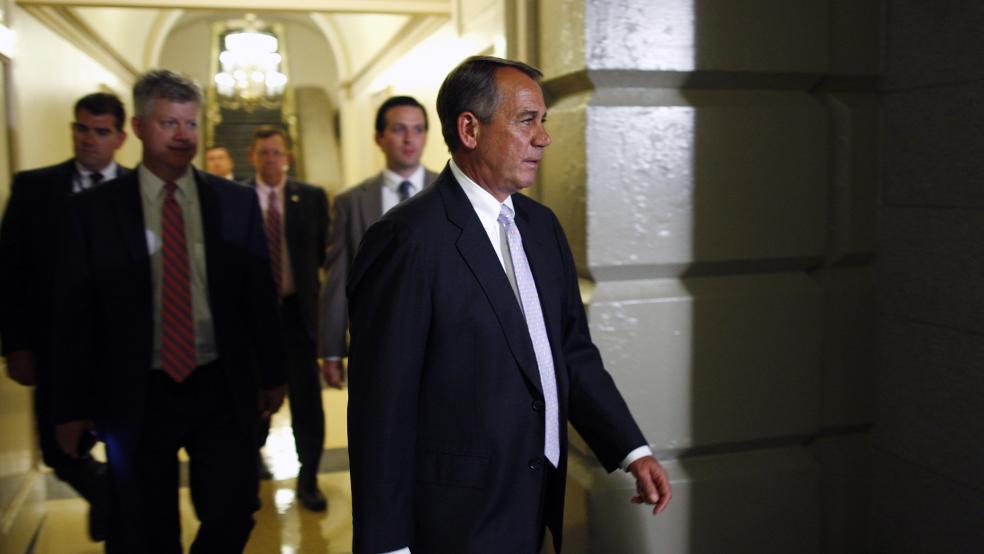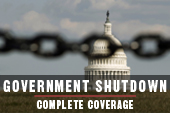For their role in shutting down the government, Republicans believed that they would save the economy … from Obamacare.
This crucial belief tends to get glossed over in explanations about the partial closure of the federal government this week.
And now with House Republicans looking to get some concessions from the White House—after their stand against Obamacare has failed—it’s critical to understand why the GOP hitched its horse to this particular wagon.
House Speaker John Boehner (R-OH) has famously labeled the 2010 Affordable Care Act as the “biggest job killer we have in America today.” Even if Republicans didn’t want a shutdown, they were clearly willing to accept it as a cost of doing business to block a law that most Americans view unfavorably.
RELATED: 6 GOOD AND BAD REASONS HEALTH CARE MAY SLOW
A shutdown could last a few weeks or even some months, subtracting somewhere between 0.1 and 0.15 percent each week in fourth quarter economic growth, according to private projections.
That’s a small price to pay if their gambit would have stopped Obamacare’s health insurance mandate from getting implemented. Conservative thinkers assume that Obamacare would choke off growth for decades to come.
“Obamacare is permanent, we’re talking generations,” said Salim Furth, a senior policy analyst with the conservative Heritage Foundation. “It’s really hard to imagine the costs of the shutdown being so great, even months of a shutdown, that would it match the generations-long costs from Obamacare.”
“The impact of the partial government shutdown will be largely temporary from a macroeconomic perspective,” said Alex Brill, a research fellow at the conservative American Enterprise Institute. “The impact of our growing entitlement obligations including Obamacare have a permanent long-run impact on GDP.”
To be clear, this strategy has been a bust so far. The Obamacare insurance exchanges opened on Tuesday to intense public interest, despite glitches in the exchanges’ web sites. Plus, President Obama and Senate Majority Leader Harry Reid (D-NV) want the government reopened without any preconditions. They also want the $16.7 trillion debt ceiling hiked before an Oct. 17 deadline, or else the country could plunge into a historic default.
But when Sen. Ted Cruz (R-TX) and allies in the House helped to instigate the shutdown by taking a hard line against Obamacare, it reflected this core assumption that the economy would benefit in the longer term.
RELATED: GLITCHES ABOUND DURING LAUNCH OF OBAMACARE EXCHANGES
As the shutdown that began Tuesday continues, the GOP has started to retreat a bit from its stance against the Affordable Care Act. House Republicans—driven by a dozen Tea Party-type lawmakers—have now been pushing for a one-year delay in implementing Obamacare. But several congressmen have suggested they would back down from that request and ask for other concessions to reopen the government.
If that’s the case, then the generations-long economic benefits that they envision will never materialize. And if the same demands resurface on their wish list for a debt ceiling increase, then the chances of a default also make this is a much riskier strategy, one capable of throwing the economy into a recession.
However, the potential economic threat posed by Obamacare has yet to be outlined with hard numbers. Neither Heritage nor the American Enterprise Institute has run any numbers about the law’s impact.
A January report by the Government Accountability Office found that the long-term affects really depend on Obamacare’s ability to contain costs. But even then, the GAO stressed that it “cannot completely isolate or quantify either the effects of [Obamacare] or of specific provisions of the act on the long-term outlook.”
Most of the estimates about the impact of Obamacare apply to the deficit, instead of the broader economy. The Congressional Budget Office estimates that the net cost of Obamacare over 11 years will be $1.3 trillion. But the law puts a cap on how much Medicare spending—a prime driver of the deficit—can grow.
RELATED: OBAMACARE—WHO MAY FALL BETWEEN THE CRACKS
Democrats are essentially betting that the law will help the economy by reducing health care inflation and remove some of the deadweight loss from uninsured Americans getting emergency medical treatment. Their projections go through 2023—and depend on whether the law works as expected.
Republicans, by contrast, see a government boondoggle that fails to control costs and forces employers to cut down the size of their full-time staffs. That’s not necessarily a bad bet. But much of the evidence for it thus far is anecdotal, such as Home Depot shifting 20,000 part-timers onto the Obamacare exchanges, instead of quantitative numbers showing the economic impact.
Boehner all but acknowledged this in a floor speech this week with his use of “unknown,” even if he still thinks the law kills jobs. He said, “We find ourselves in this moment dealing with a law that’s causing unknown consequences and unknown damage to the American people and to our economy.”





